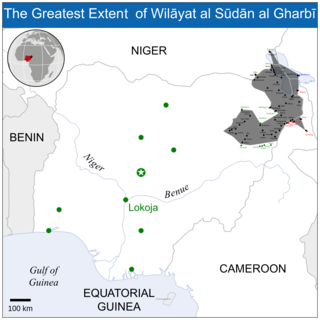Related Research Articles

Goodluck Ebele Azikiwe Jonathan is a Nigerian politician who served as the president of Nigeria from 2010 to 2015. He lost the 2015 presidential election to former military head of state General Muhammadu Buhari, and was the first incumbent president in Nigerian history to concede defeat in an election. Prior to that, he served as the vice president of Nigeria from 2007 to 2010 under the administration of Umaru Musa Yar'Adua; and in oil-rich Bayelsa State as governor from 2005 to 2007, and deputy governor from 1999 to 2005.

Boko Haram, officially known as Jamā'at Ahl as-Sunnah lid-Da'wah wa'l-Jihād, is an Islamist militant organization based in northeastern Nigeria, which is also active in Chad, Niger, northern Cameroon, and Mali. Boko Haram was the world's deadliest terror group during part of the mid-2010s according to the Global Terrorism Index. In 2016, the group split, resulting in the emergence of a hostile faction known as the Islamic State's West Africa Province.
Marte is a Local Government Area of Borno State, Nigeria, on the western coast of Lake Chad. Its headquarters are in the town of Marte
Bama is a local government area of Borno State, Nigeria. It has its headquarters in the town of Bama.

Gwoza is a local government area of Borno State, Nigeria. Its headquarters are in the town of Gwoza, a border town "about 135 kilometres South-East of Maiduguri." The postal code of the area is 610.

The Boko Haram insurgency began in July 2009, when the militant Islamist and jihadist rebel group Boko Haram started an armed rebellion against the government of Nigeria. The conflict is taking place within the context of long-standing issues of religious violence between Nigeria's Muslim and Christian communities, and the insurgents' ultimate aim is to establish an Islamic state in the region.
On 6 July 2013, Boko Haram insurgents attacked the Government Secondary School in the village of Mamudo in Yobe State Nigeria and killed at least 42 people. Most of the dead were students, though some staff members were also killed.
On 29 September 2013, gunmen from Boko Haram entered the male dormitory in the College of Agriculture in Gujba, Yobe State, Nigeria, killing forty-four students and teachers.
Timeline of the Boko Haram insurgency is the chronology of the Boko Haram insurgency, an ongoing armed conflict between Nigerian Islamist group Boko Haram and the Nigerian government. Boko Haram have carried out many attacks against the military, police and civilians since 2009, mostly in Nigeria. The low-intensity conflict is centred on Borno State. It peaked in the mid 2010s, when Boko Haram extended their insurgency into Cameroon, Chad and Niger.
The Konduga massacre took place in Konduga, Borno State, Nigeria on 11 February 2014. The massacre was conducted by Boko Haram Islamists against Christian villagers. At least 62 people were killed.
Gamboru is a market town in Borno State, northeast Nigeria, near the Cameroon border. It is the administrative centre of Ngala local government area.

On the evening of 1 June 2014, an improvised explosive device was set off at a football field in Mubi, Adamawa State, Nigeria. At least 40 people were killed in the attack, according to eyewitnesses. Nineteen others were injured. The perpetrators of the attack were not clear, although media reports generally blamed Boko Haram.
From 20 to 23 June 2014, a series of attacks occurred in Borno State, Nigeria. 91 women and children were kidnapped in the attacks and more than 70 people were killed.
The May 2014 Buni Yadi attack was a terrorist attack that occurred on 27 May 2014 in the town of Buni Yadi, Yobe State, Nigeria. Some 49 security personnel and 9 civilians were killed.
The following lists events from 2014 in Nigeria.
The 2015 Baga massacre was a series of mass killings carried out by the Boko Haram terrorist group in the north-eastern Nigerian town of Baga and its environs, in the state of Borno, between 3 January and 7 January 2015.

Starting in late January 2015, a coalition of West African troops launched an offensive against the Boko Haram insurgents in Nigeria.
The Battle of Kodunga was a military engagement between the Nigerian Armed Forces and Boko Haram insurgents in Konduga, Borno State, northeastern Nigeria, in September 2014.
On 30 January 2016, at least 86 people were killed and at least 62 more injured in an attack by Boko Haram militants on Dalori Village 4 kilometers from Maiduguri, Nigeria. The attack was a reprisal against the Civilian Joint Task Force, and it began when militants in two cars and on motorcycles entered Dalori and began to shoot at residents and firebomb their huts. One estimate is that perhaps more than 100 militants were involved in the attack. The attack lasted for about four hours, and the militants allegedly burnt children alive.
The Damasak massacre was a series of massacres and mass execution committed by Boko Haram in the city of Damasak, Nigeria.
References
- 1 2 "Boko Haram insurgents kill 100 people as they take control of Nigerian town". The Guardian . 2014-07-19. Archived from the original on 2022-11-09.
- 1 2 "Nigeria: Boko Haram tue au moins 100 personnes". lapresse.ca. Retrieved 2020-04-11.